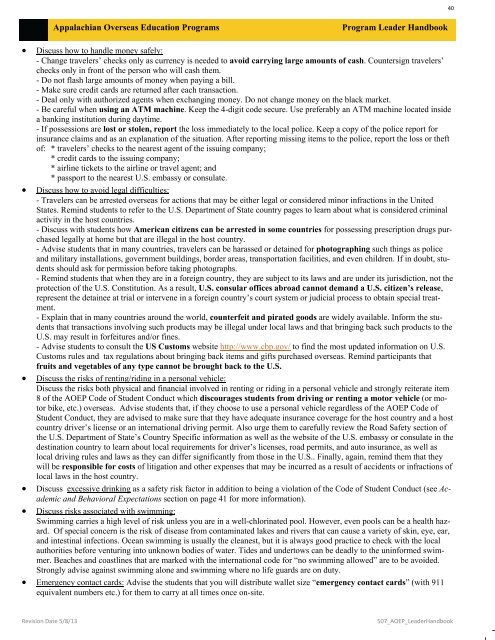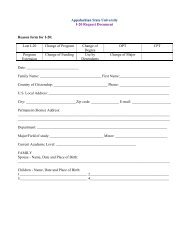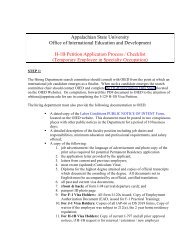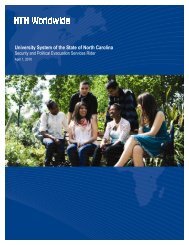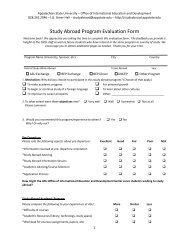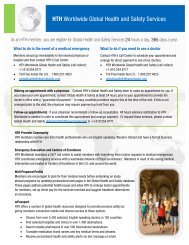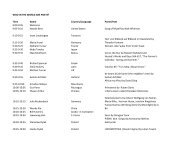Program Leader Handbook - International Education and ...
Program Leader Handbook - International Education and ...
Program Leader Handbook - International Education and ...
Create successful ePaper yourself
Turn your PDF publications into a flip-book with our unique Google optimized e-Paper software.
40<br />
Appalachian Overseas <strong>Education</strong> <strong>Program</strong>s <strong>Program</strong> <strong>Leader</strong> <strong>H<strong>and</strong>book</strong><br />
Discuss how to h<strong>and</strong>le money safely:<br />
- Change travelers’ checks only as currency is needed to avoid carrying large amounts of cash. Countersign travelers’<br />
checks only in front of the person who will cash them.<br />
- Do not flash large amounts of money when paying a bill.<br />
- Make sure credit cards are returned after each transaction.<br />
- Deal only with authorized agents when exchanging money. Do not change money on the black market.<br />
- Be careful when using an ATM machine. Keep the 4-digit code secure. Use preferably an ATM machine located inside<br />
a banking institution during daytime.<br />
- If possessions are lost or stolen, report the loss immediately to the local police. Keep a copy of the police report for<br />
insurance claims <strong>and</strong> as an explanation of the situation. After reporting missing items to the police, report the loss or theft<br />
of: * travelers’ checks to the nearest agent of the issuing company;<br />
* credit cards to the issuing company;<br />
* airline tickets to the airline or travel agent; <strong>and</strong><br />
* passport to the nearest U.S. embassy or consulate.<br />
Discuss how to avoid legal difficulties:<br />
- Travelers can be arrested overseas for actions that may be either legal or considered minor infractions in the United<br />
States. Remind students to refer to the U.S. Department of State country pages to learn about what is considered criminal<br />
activity in the host countries.<br />
- Discuss with students how American citizens can be arrested in some countries for possessing prescription drugs purchased<br />
legally at home but that are illegal in the host country.<br />
- Advise students that in many countries, travelers can be harassed or detained for photographing such things as police<br />
<strong>and</strong> military installations, government buildings, border areas, transportation facilities, <strong>and</strong> even children. If in doubt, students<br />
should ask for permission before taking photographs.<br />
- Remind students that when they are in a foreign country, they are subject to its laws <strong>and</strong> are under its jurisdiction, not the<br />
protection of the U.S. Constitution. As a result, U.S. consular offices abroad cannot dem<strong>and</strong> a U.S. citizen’s release,<br />
represent the detainee at trial or intervene in a foreign country’s court system or judicial process to obtain special treatment.<br />
- Explain that in many countries around the world, counterfeit <strong>and</strong> pirated goods are widely available. Inform the students<br />
that transactions involving such products may be illegal under local laws <strong>and</strong> that bringing back such products to the<br />
U.S. may result in forfeitures <strong>and</strong>/or fines.<br />
- Advise students to consult the US Customs website http://www.cbp.gov/ to find the most updated information on U.S.<br />
Customs rules <strong>and</strong> tax regulations about bringing back items <strong>and</strong> gifts purchased overseas. Remind participants that<br />
fruits <strong>and</strong> vegetables of any type cannot be brought back to the U.S.<br />
Discuss the risks of renting/riding in a personal vehicle:<br />
Discuss the risks both physical <strong>and</strong> financial involved in renting or riding in a personal vehicle <strong>and</strong> strongly reiterate item<br />
8 of the AOEP Code of Student Conduct which discourages students from driving or renting a motor vehicle (or motor<br />
bike, etc.) overseas. Advise students that, if they choose to use a personal vehicle regardless of the AOEP Code of<br />
Student Conduct, they are advised to make sure that they have adequate insurance coverage for the host country <strong>and</strong> a host<br />
country driver’s license or an international driving permit. Also urge them to carefully review the Road Safety section of<br />
the U.S. Department of State’s Country Specific information as well as the website of the U.S. embassy or consulate in the<br />
destination country to learn about local requirements for driver’s licenses, road permits, <strong>and</strong> auto insurance, as well as<br />
local driving rules <strong>and</strong> laws as they can differ significantly from those in the U.S.. Finally, again, remind them that they<br />
will be responsible for costs of litigation <strong>and</strong> other expenses that may be incurred as a result of accidents or infractions of<br />
local laws in the host country.<br />
Discuss excessive drinking as a safety risk factor in addition to being a violation of the Code of Student Conduct (see Academic<br />
<strong>and</strong> Behavioral Expectations section on page 41 for more information).<br />
Discuss risks associated with swimming:<br />
Swimming carries a high level of risk unless you are in a well-chlorinated pool. However, even pools can be a health hazard.<br />
Of special concern is the risk of disease from contaminated lakes <strong>and</strong> rivers that can cause a variety of skin, eye, ear,<br />
<strong>and</strong> intestinal infections. Ocean swimming is usually the cleanest, but it is always good practice to check with the local<br />
authorities before venturing into unknown bodies of water. Tides <strong>and</strong> undertows can be deadly to the uninformed swimmer.<br />
Beaches <strong>and</strong> coastlines that are marked with the international code for “no swimming allowed” are to be avoided.<br />
Strongly advise against swimming alone <strong>and</strong> swimming where no life guards are on duty.<br />
Emergency contact cards: Advise the students that you will distribute wallet size “emergency contact cards” (with 911<br />
equivalent numbers etc.) for them to carry at all times once on-site.<br />
Revision Date 5/8/13<br />
507_AOEP_<strong>Leader</strong><strong>H<strong>and</strong>book</strong>


